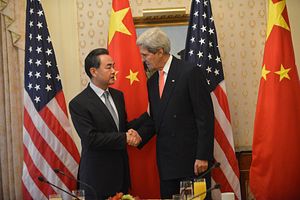As The Diplomat noted earlier, U.S. Secretary of State John Kerry is one his first trip to Asia in 2016, with stops in Laos, Cambodia, and China. Ahead of Kerry’s meetings with Chinese officials on Wednesday, Beijing is making it crystal clear that it has no intention of changing its position on North Korea – effectively scuttling one of the major purposes of Kerry’s trip before he even arrives.
The U.S.-China divide over how to respond to North Korea’s nuclear test on January 6 is clear from the news (or lack thereof) on additional UN Security Council sanctions. Nearly three weeks after North Korea detonated a nuclear device, U.S. Ambassador to the UN Samantha Power was asked by Reuters if the United States and China (both permanent, veto-wielding members of the UNSC) were close to an agreement on sanctions. Her answer was short and to the point: “No.” By contrast, the UNSC passed a resolution with a new sanctions package just over three weeks after Pyongyang’s nuclear test in 2013.
Kyodo News and NK News indicated that the current sticking point is over a U.S. proposal that would heavily sanction oil exports to North Korea. China, North Korea’s major oil supplier, opposes that draft.
The disconnect over dealing with North Korea’s nuclear program will be “on the top of the agenda” during Kerry’s meetings in Beijing, a senior State Department officials told reporters on Monday. “The Secretary has made no secret either to the Chinese or to you, the media, of his conviction that there is much more that China can do by way of applying leverage,” the official said. “[…]I know that he’s going to be looking for practical and effective steps on the part of the Chinese.”
In particular, the official said Kerry would be talking not only about Security Council action, but also “the issue of what China on a unilateral basis, as North Korea’s lifeline, as North Korea’s patron, will choose to do.”
That’s not the first time U.S. officials have also publicly called on China to do more in the wake of North Korea’s fourth nuclear test. Kerry previously told reporters that China’s approach to North Korea was not working and that “we cannot continue business as usual.” He indicated he had said so directly to his Chinese counterpart, Foreign Minister Wang Yi. Such public remarks are designed both to send a message that the United States is taking a firm stance on the issue (though not necessarily a productive one, as 38 North’s Joel Wit explained in a recent podcast) and to up the pressure on China to act.
China’s response, however, has been to dismiss the criticisms out of hand, and double down on its usual response to North Korea’s violations of UN Resolutions: namely, to urge all parties to exercise restraint and return to dialogue via the Six-Party Talks.
On Tuesday, Foreign Ministry spokesperson Hua Chunying defended China’s record on North Korea, saying U.S. criticisms “make no sense.” Hua also threw the ball back in the U.S. court, saying “it cannot solely rely on China to realize denuclearization on the Korean Peninsula… It calls for concerted efforts of all parties to work toward the same direction.”
“Some parties’ failure to do so is one major reason why the denuclearization process on the Peninsula has ran into difficulties and the Six Party Talks is on a temporary hold,” Hua added, and it was clear the major target of her remarks was the United States. So while the United States blames China for not enacting tougher sanctions, Beijing remains adamant that Washington is the problem for not returning to the Six Party Talks (which went officially defunct in 2009).
China has moved quickly from expressing “firm” opposition to the nuclear test to now urging “all relevant parities” to “shoulder their due responsibilities and obligations and push for an early and proper settlement of the Korean nuclear issue.” Beijing’s response comes alongside reports that North Korea has reached out to China saying it will not halt nuclear tests until it has negotiated a peace treaty with the United States. That provides ample opportunity for Beijing to blame Washington for its lack of vision in dealing with Pyongyang.
Given the content and tone of recent official remarks from China, Kerry’s not going to find a receptive audience in Beijing when he lays out the U.S. position on the North Korea issue. And unless the two sides can somehow forge a united approach to North Korea, a fifth nuclear test looks inevitable.

































